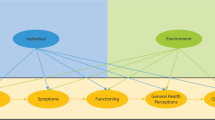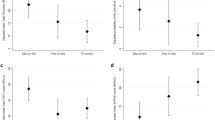Abstract
TANGO2 disorder is a rare genetic disease with multi-system effects that causes episodic crises. Quality of life and psychosocial effects of this rare disease have not previously been studied. To examine health-related quality of life (HRQoL), illness perceptions, and lived experience, we surveyed 16 children and 31 parents of children with TANGO2 disorder identified via a disease-specific social media group and research foundation email distribution list. We assessed HRQoL by parent proxy-report and child self-report using the Pediatric Quality of Life Inventory (PedsQL™). Parental perceptions of their child’s condition were assessed using the revised illness perceptions questionnaire adapted for TANGO2 disorder (IPQ-R-TANGO2). To collect qualitative data on parents’ lived experience, we used novel open-ended survey questions. Parent proxy-reported (n = 29) physical (78.4 (21)) and psychosocial health (73.4 (12.8)) were highest among toddlers with TANGO2 disorder. Parent proxy-reported physical health was lowest in young adults (34.4 (35.4)), and psychosocial health was lowest in teens (40.8 (10.8)). When compared to previously published PedsQL™ scores in healthy children, parent-proxy reported summary and scale scores for TANGO2 patients were significantly lower (all p < 0.001). Parents’ IPQ-R-TANGO2 responses (n = 26) suggested that parents perceived significant negative consequences of the disease. Parents’ open-ended survey responses (n = 21) highlighted that they derived support from the TANGO2 community. This study characterizes HRQoL in patients with TANGO2 disorder across a range of ages, identifies potential targets for HRQoL improvement, and provides valuable insight into the psychosocial effects of TANGO2 disorder on patients and their families.
This is a preview of subscription content, access via your institution
Access options
Subscribe to this journal
Receive 12 print issues and online access
$259.00 per year
only $21.58 per issue
Buy this article
- Purchase on SpringerLink
- Instant access to the full article PDF.
USD 39.95
Prices may be subject to local taxes which are calculated during checkout


Similar content being viewed by others
Data availability
The data that support the findings of this study are available on request from the corresponding author. The data are not publicly available due to privacy or ethical restrictions.
References
Lalani SR, Liu P, Rosenfeld JA, Watkin LB, Chiang T, Leduc MS, et al. Recurrent muscle weakness with rhabdomyolysis, metabolic crises, and cardiac arrhythmia due to bi-allelic TANGO2 mutations. Am J Hum Genet. 2016;98:347–57.
Cohen JS, Biesecker BB. Quality of life in rare genetic conditions: a systematic review of the literature. Am J Med Genet A. 2010;152A:1136–56.
Joyce P, O’Rourke C, McDermott B, Heussler H. Health-related quality of life in 22q11.2 deletion syndrome: The child’s perspective. J Paediatr Child Health. 2018;54:311–5.
Zeltner NA, Huener M, Baumgartner MR, Landolt MA. Quality of life, psychological adjustment, and adaptive functioning of patients with intoxication-type inborn errors of metabolism – a systematic review. Orphanet J Rare Dis. 2014;9:159–76.
Dimitrova, N, Glaus, J, Urben, S, Wuthrich, V, Harari, MM, Ballhausen, D. The impact of disease severity on the psychological well-being of youth affected by an inborn error of metabolism and their families: a one-year longitudinal study. Mol Genet Metab Rep. 2021. https://doi.org/10.1016/j.ymgmr.2021.100795.
Moss-Morris R, Weinman J, Petrie KJ, Horne R, Cameron LD, Buick D. The revised illness perception questionnaire (IPQ-R). Psychol Health. 2002;17:1–16.
Petrie KJ, Jago LA, Devcich DA. The role of illness perceptions in patients with medical conditions. Curr Opin Psychiatry. 2007;20:163–7.
Andersen J, Nordin K, Sandberg S. Illness perception and psychological distress in persons with porphyria cutanea tarda. Acta Derm Venereol. 2016;96:674–8.
Th Atwa Z, Abdel Wahed WY. The impact of illness perception and socio-clinico-demographic factors on perceived quality of life in children and adolescents with thalassemia intermedia. Pediatr Blood Cancer. 2019;66:e27745.
Dilger H, Leissner L, Bosanska L, Lampe C, Plockinger U. Illness perception and clinical treatment experiences in patients with M. Maroteaux-Lamy (mucopolysaccharidosis type IV) and a Turkish migration background in Germany. PLoS ONE. 2013;8:e66804.
Sawicki GS, Sellers DE, Robinson WM. Associations between illness perceptions and health-related quality of life in adults with cystic fibrosis. J Psychosom Res. 2011;70:161–7.
Helder DI, Kaptein AA, Van Kempen GMJ, Weinman J, Van Houwelingen JC, Roos RAC. Living with Huntington’s disease: illness perceptions, coping mechanisms, and spouses’ quality of life. Int J Behav Med. 2002;9:37–52.
Richardson AE, Morton RP, Broadbent EA. Changes over time in head and neck cancer patients’ and caregivers’ illness perceptions and relationships with quality of life. Psychol Health. 2016;31:1203–19.
Richardson AE, Morton R, Broadbent E. Caregivers’ illness perceptions contribute to quality of life in head and neck cancer patients at diagnosis. J Psychosoc Oncol. 2015;33:414–32.
Richardson AE, Morton RP, Broadbent EA. Illness perceptions and coping predict post-traumatic stress in caregivers of patients with head and neck cancer. Support Care Cancer. 2016;24:4443–50.
Matthews A, Lenz KR, Peugh J, Copps EC, Peterson CM. Caregiver burden and illness perceptions in caregivers of medically hospitalized youth with anorexia nervosa. Eat Behav. 2018;29:14–8.
Harris PA, Taylor R, Thielke R, Payne J, Gonzalez N, Conde JG. Research electronic data capture (REDCap) – a metadata-driven methodology and workflow process for providing translational research informatics support. J Biomed Inf. 2009;42:377–81.
Varni JW, Seid M, Kurtin PS. PedsQL™ 4.0: reliability and validity of the pediatric quality of life inventory™ version 4.0 generic core scales in healthy and patient populations. Med Care. 2001;39:800–12.
Schymick J, Leahy P, Cowan T, Ruzhnikov MRZ, Gates R, Fernandez L, et al. Variable clinical severity in TANGO2 deficiency: case series and literature review. Am J Med Genet A. 2021. https://doi.org/10.1002/ajmg.a.62543.
The Illness Perception Questionnaire Website. 2020. http://ipq.h.uib.no//index.html.
Mire SS, Tolar TD, Brewton CM, Raff NS, Mckee SL. Validating the Revised Illness Perception Questionnaire as a measure of parent perceptions of autism spectrum disorder. J Autism Dev Disord. 2018;48:1761–79.
Varni JW, MAPI Research Trust. Pediatric quality of life inventory™ PedsQL scoring manual.
Streiner DL, Norman, GR, Cairney, J. Health measurement scales: a practical guide to their development and use. 5th ed. Oxford University Press: Oxford; 2015.
Splinter K, Niemi AK, Cox R, Platt J, Shah M, Enns GM, et al. Impaired health-related quality of life in children and families affected by methylmalonic acidemia. J Genet Couns. 2016;25:936–44.
Dines JN, Golden-Grant K, Lacroix A, Muir AM, Laboy Cintron D, McWalter K, et al. TANGO2: expanding the clinical phenotype and spectrum of pathogenic variants. Genet Med. 2019;21:601–7.
Alishbayli G, Kilinc AA, Cokugras H. Evaluation of the health-related quality of life in Turkish cystic fibrosis patients. Pediatr Int. 2021;68:965–70.
Ballard LM, Jenkinson E, Byrne CD, Child JC, Inskip H, Lokulo-Sodipe O, et al. Experience of adolescents living with Silver-Russell syndrome. Arch Dis Child. 2021;106:1195–201.
Sanchez-Lopez CR, Perestelo-Perez L, Escobar A, Lopez-Bastida J, Serrano-Aguilar P. Health-related quality of life in patients with spinocerebellar ataxia. Neurologia. 2017;32:143–51.
Grootenhuis M, de Boone J, van der Kooi A. Living with muscular dystrophy: health related quality of life consequences for children and adults. Health Qual Life Outcomes. 2007;5:31–8.
Dempster M, Howell D, McCorry NK. Illness perceptions and coping in physical health conditions: a meta-analysis. J Psychosom Res. 2015;79:506–13.
Solmaz N, Ilhan N, Bulut H. The effect of illness perception on life quality in psoriasis patients. Psychol Health Med. 2021;26:955–67.
Unal O, Akyol Y, Tander B, Ulus Y, Terzi Y, Kuru O. The relationship of illness perceptions with demographic features, pain, severity, functional capacity, disability, depression, and quality of life in patients with chronic low back pain. Turk J Phys Med Rehabil. 2019;65:301–8.
Dellenmark-Blom M, Chaplin J, Jonsson L, Gatzinsky V, Quitmann JH, Abrahamsson K. Coping strategies used by children and adolescents born with esophageal atresia – a focus group study obtaining the child and parent perspective. Child Care Health Dev. 2016;42:759–67.
Feragen KB, Stock NM, Myhre A, Due-tonnessen BJ. Medical stress reactions and personal growth in parents of children with a rare craniofacial condition. Cleft Palate Craniofac J. 2020;57:228–37.
Currie G, Szabo J. “It is like a jungle, gym, and everything is under construction”: The parent’s perspective of caring for a child with a rare disease. Child Care Health Dev. 2019;45:96–103.
Germeni E, Vallini I, Bianchetti MG, Schulz PJ. Reconstructing normality following the diagnosis of a childhood chronic disease: Does “rare” make a difference? Eur J Pediatr. 2018;177:489–95.
Acknowledgements
The authors would like to thank Denese Neu, the Engagement Officer at PCORI for assisting with the family conference workshops. We are also grateful to the members of the TANGO2 community, who engaged enthusiastically with this research from the start and enabled the authors to complete this project.
Funding
While engaged in this work, CNM was supported by the Medical Genetics Research Fellowship Program (T32 GM07526-42), HSS was supported by a grant from the National Human Genome Research Institute (K99HG011491) and CYM was supported by National Institutes of Health, K23-HL136932. Research reported in this publication was funded through a Patient-Centered Outcomes Research Institute® (PCORI®) Award (EAIN-11402) to SRL and by the TANGO2 Research Foundation.
Author information
Authors and Affiliations
Contributions
CNM was responsible for study design, survey selection, participant recruitment, data collection, co-leading the workshop, data analysis, result interpretation, and writing the manuscript. SRL contributed to participant recruitment, capacity-building, and provided feedback on the manuscript. MSA contributed to participant recruitment and capacity-building. CYM provided substantial feedback on the manuscript. HSS was responsible for study design, survey selection, co-leading the workshop, data analysis, and provided feedback on the manuscript.
Corresponding author
Ethics declarations
Competing interests
The authors declare no competing interests.
Ethical approval
This study was approved by the Institutional Review Board for Human Subjects Research at Baylor College of Medicine.
Additional information
Publisher’s note Springer Nature remains neutral with regard to jurisdictional claims in published maps and institutional affiliations.
Supplementary information
Rights and permissions
About this article
Cite this article
Murali, C.N., Lalani, S.R., Azamian, M.S. et al. Quality of life, illness perceptions, and parental lived experiences in TANGO2-related metabolic encephalopathy and arrhythmias. Eur J Hum Genet 30, 1044–1050 (2022). https://doi.org/10.1038/s41431-022-01127-5
Received:
Revised:
Accepted:
Published:
Version of record:
Issue date:
DOI: https://doi.org/10.1038/s41431-022-01127-5



